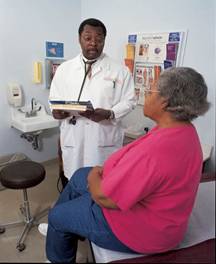|
|
A Tale of Two Health Care Systems
Saul Friedman, Newsdays
August 21, 2004

Too many of us on Medicare have been victims of age discrimination, as when a doctor decides you're too old to be treated for what ails you and says, "You have to expect that at your age." Much worse is the potentially deadly inequality in the care given to elderly black patients on Medicare compared with whites.
This is not all the fault of Medicare, which has been a lifesaver for its 40 million elderly and disabled beneficiaries, including 3.5 million blacks.
And for millions of poor Americans of all races, Medicare and Medicaid are their only links to medical care, although they spend hours waiting with fever and pain in clinics and emergency rooms.
More than 690,000 low-income blacks are among the 4 million beneficiaries eligible for a $600 credit toward their prescription drugs this year and next under the current drug discount card program. These beneficiaries stand to benefit the most under the new Medicare Modernization Act, which is to take full effect in 2006.
But starting this January, Medicare will cover most of the cost of lab tests for cardiovascular disease, hypertension and diabetes, for which blacks are more at risk than whites. Blacks, who suffer disproportionately from obesity, may benefit from Medicare's recognition that obesity is a disease.
The average life span among blacks is 72 years compared to 78 for whites. And according to a study by the Harvard School of Public Health, blacks enrolled in Medicare HMOs were less likely than whites to get routine breast and prostate cancer screenings, follow-up care to prevent repeat heart attacks, professional help after a hospitalization for mental illness, or eye exams to prevent glaucoma.
Some researchers said the differences in treatment between blacks ands whites with similar insurance coverage may be explained by racism on the part of the white medical establishment. But while the authors of the study said that inferior treatment of blacks helped explain why they have higher rates of blindness from glaucoma and higher death rates from breast and prostate cancer, the researchers couldn't pinpoint the reasons for the inferior treatment.
Earlier this month, however, the New England Journal of Medicine published a study that shed more light on why black patients don't get quality care.
The researchers from New York's Sloan-Kettering Cancer Center and the Center for Studying Health Change analyzed data from 150,391 routine visits by black and white Medicare beneficiaries to 4,355 primary care physicians. They found that black doctors treating mostly black patients in largely black neighborhoods have greater difficulty than their white counterparts in delivering high-quality care, because they have less training and access to fewer clinical and diagnostic resources. And they are beleaguered by waiting rooms crowded with non-Medicare patients, without enough insurance or money to see a doctor regularly or fill prescriptions.
While 22 percent of the doctors, mostly black, provided 80 percent of the visits with black Medicare patients, 77 percent of the black doctors were board certified in their primary care specialty compared to 86 percent of the white doctors.
And, the study also found, "The physicians treating black patients reported facing greater difficulties in obtaining access for their patients to high-quality specialists, high-quality diagnostic imaging and non-emergency admission to the hospital." Thus, fewer blacks with heart disease undergo angiography, angioplasty or bypass surgery
The study's lead author, Dr. Peter Bach of Sloan-Kettering, said, "The findings paint a picture of two health systems, where physicians treating black patients appear to have less access to important clinical resources and be less well-trained."
The black medical establishment agreed with the findings. In a joint statement, the National Medical Association and four mostly black medical schools said the study "confirms the American medical system's tragic negligence to provide minority patients with the high-quality medical care they deserve."
Dr. Arnold M. Epstein, who conducted the Harvard study, wrote in an accompanying editorial, "Despite ... social progress and integration ... the United States is still a society in which racial and ethnic characteristics are strongly associated with socioeconomic class and opportunity ... . In health care, integration is not complete and separate is not equal."
I don't mean to belittle the role of racism in this inequality. But for the 44 million uninsured American working families, white as well as black, and for retirees losing coverage, the irrational American health care system, based on ability to pay, is also separate and unequal. And among millions of us in the middle class, who are hanging onto our coverage and worrying about Medicare, there's little doubt that in America some are more equal than others.
|
|



